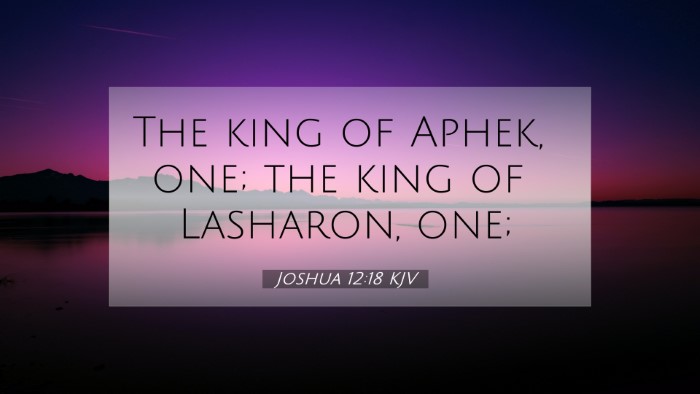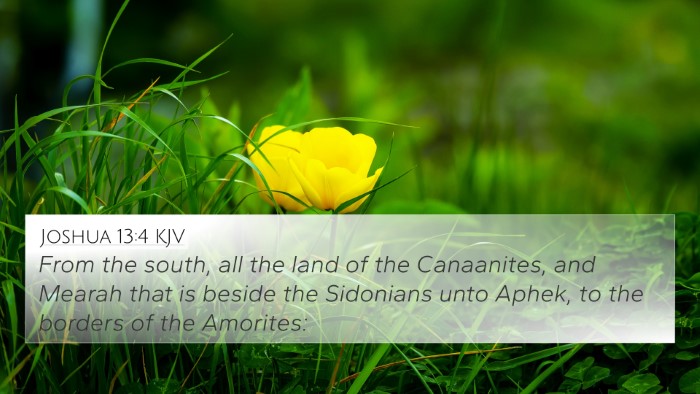Understanding Joshua 12:18
Joshua 12:18 states: "The king of the people of Arad, who dwelt in the plain." This verse may seem straightforward, but it encapsulates deeper meanings when analyzed through the lens of biblical commentaries.
Verse Context and Historical Significance
The verse is part of a larger narrative in the Book of Joshua, which recounts the conquest and division of the Promised Land among the tribes of Israel. Understanding the historical context of this passage is crucial as it reflects God’s promise fulfilled to His people.
According to Matthew Henry, this verse highlights the significance of the kings subdued during Israel's conquest, illustrating the power of God in providing victory over powerful adversaries. The mention of the king of Arad serves to remind the Israelites of the many battles fought and won in faith and obedience to God.
Albert Barnes notes that the king of Arad came from the southern region of Canaan, and his defeat marked a critical moment for the Israelites as it showcased their establishment in the land God promised to them.
Thematic Connections and Cross-References
This verse can be connected to various themes and cross-references in the Bible that demonstrate God’s faithfulness and the narrative of Israel’s journey. Below are notable references and their significance:
- Numbers 21:1-3: This passage recounts the initial conflict with the king of Arad, establishing the connection between the two verses and illustrating Israel's ongoing struggles.
- Deuteronomy 3:1-2: It also references the defeat of Og and Sihon, which emphasizes God’s power over Israel’s enemies.
- Joshua 10:16-27: Highlights a significant battle in which God intervened on behalf of Israel, showcasing divine support in their conquests.
- 1 Samuel 30:1: Reflects on battles with the Amalekites, presenting a broader narrative of warfare in the Bible.
- Psalm 44:3: This psalm expresses how Israel did not conquer the land by their own strength but by God's mighty right hand, establishing a theologically rich connection to Joshua 12:18.
- Ephesians 1:11: Recognizes that God works all things according to the counsel of His will, resonating with Israel’s victories and struggles.
- Romans 8:31: Questions, “If God is for us, who can be against us?” reinforcing the themes of trust in God’s sovereignty seen in Joshua 12:18.
Comparative Analysis and Interconnections
When conducting a comparative Bible verse analysis, it is essential to consider how Joshua 12:18 embodies God’s overarching plan for the Israelites and foreshadows the deeper fulfillment of His promises in the New Testament. Adam Clarke comments on the necessity of recognizing the spiritual implications of these battles, which serve as a metaphor for the spiritual struggles Christians face today.
Consequently, understanding Joshua 12:18 within a broader scriptural context not only enhances our grasp of Old Testament narratives but also links them to New Testament promises, hence creating a rich tapestry of biblical theology.
Tools for Cross-Referencing and Study
For those looking to delve deeper into cross-referencing Biblical texts, the following tools and methods are recommended:
- Bible Concordance: Utilize a comprehensive concordance that lists words and their occurrences throughout the Bible.
- Bible Cross-Reference Guide: Consult guides that provide thematic and contextual connections between verses.
- Cross-Reference Bible Study: Engage in study methods that emphasize interconnections between verses and passages to glean deeper insights.
Conclusion
Joshua 12:18 represents more than a simple historical fact; it is interwoven with deeper spiritual truths and lessons. Through scriptural cross-referencing, one can uncover a wealth of knowledge that links this verse to the broader narrative of salvation history, illustrating God's faithfulness and power over adversaries.
This verse invites us to explore the rich connections between passages, enhancing not only our understanding of Scripture but also deepening our faith as we see the consistent thread of God's promises throughout the Biblical narrative.






